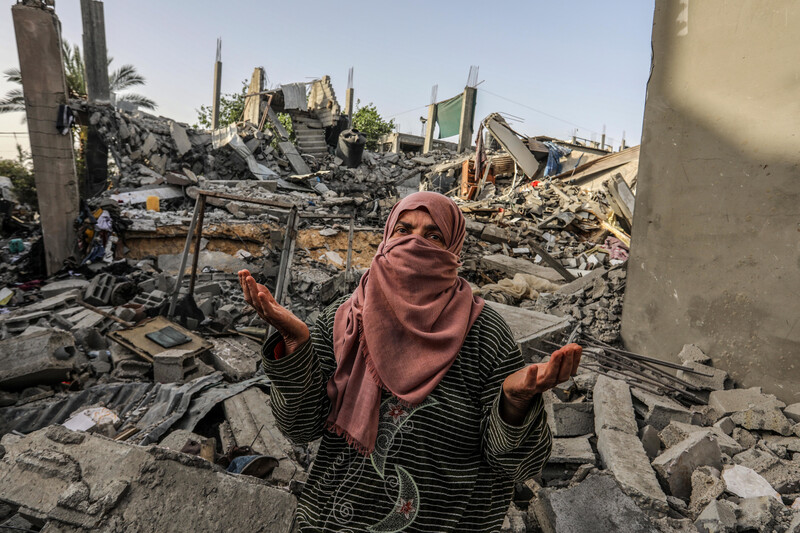The Electronic Intifada 5 November 2024

A woman seaches through the rubble of a home in Rafah, the southern Gaza Strip, in April.
APA imagesWhen Nahla al-Najjar, 62, left the northern Gaza Strip in August she carried with her not only grief for two of her sons, but the pain from the cancer that had worn down her body.
She also left behind four other sons whom she feared for and missed every moment.
Israel killed one of Nahla’s sons in 2019. Muhammad al-Najjar, 26, was shot near the boundary with Israel while working on agricultural land as hired labor.
Her grief affected Nahla’s health. She had to go to hospital for medical tests, where it was determined she had uterine cancer.
So rapidly did her condition decline that doctors had no choice but to recommend her for transfer to occupied East Jerusalem, where she received treatment for about a year at al-Makassed hospital. Her condition improved and the cancer receded.
However, while passing through the Israeli military checkpoint at Erez, she was, she told The Electronic Intifada, “questioned about my sons, their studies, and work. Then the officer said: ‘Your sons are terrorists, and we will kill them as we killed Muhammad.’”
Nahla’s home was destroyed early in Israel’s genocide last October. But though the military had already then ordered residents to move south, Nahla stayed in the north. She sought shelter at the Indonesian Hospital in Beit Lahiya, where she could also have her health monitored.
She could not, she said, go south where she had no relatives and where hospitals were overcrowded with displaced people and the wounded.
Famine forces move
Conditions in northern Gaza were already extremely dire when famine hit just before summer. Hospitals in the area were targeted, medical supplies were running out, electricity had long been cut and medical services all but ceased.
By July, Nahla was also grieving for another son, Younes, 20, who was killed when a shell struck the house of a friend where he was staying in the Jabaliya refugee camp.
She finally decided to go south. She arrived in Khan Younis and immediately went to Nasser Medical Complex for a check up. There, she was diagnosed with pelvic cancer.
Her son Noah had asked me to visit his mother there, and we shared stories of her deceased sons, who had also been my friends.
But the unspoken reality was that Nahla and other cancer patients were effectively on death row. Israel has blocked patients from leaving Gaza to seek treatment in Jerusalem or the West Bank since last October, and, once it seized the Philadelphi corridor along the border with Egypt, Gaza’s only other exit to the outside world was blocked too.
When I visited her at Nasser hospital, Nahla told me that it was her grief over Younes that had affected her health.
“I had no illness in my body. All that happened to me is because of my grief over Younes. Now, I also know nothing about my other sons.”
I tried to get her to eat, helping her as best I could, but she often refused. Even food didn’t seem appealing to her because of her intense grief and her longing for those left behind in the north.
A lonely end
Nahla’s health steadily deteriorated. The pelvic cancer affected her severely, causing a blockage in her urinary tract, leading to fluid buildup in her body.
The doctors couldn’t do anything to save her. They didn’t have the resources. Moreover, there was no cure for her grief, which was tearing her apart inside.
I did what I could to comfort her. I kept her company when I could and brought her food and medicine.
Nahla passed away on the morning of 13 September. She was alone and far from her sons.
Because I was in the area while none of Nahla’s relatives were present, I completed the necessary bureaucracy and obtained her burial permit.
Distant relatives came and took her body to bury it in the Nuseirat camp in central Gaza.
Nahla was not the first victim of Israel’s deliberate targeting of Gaza’s health service.
She won’t be the last.
Refaat Ibrahim is a writer and journalist from the Gaza Strip.



